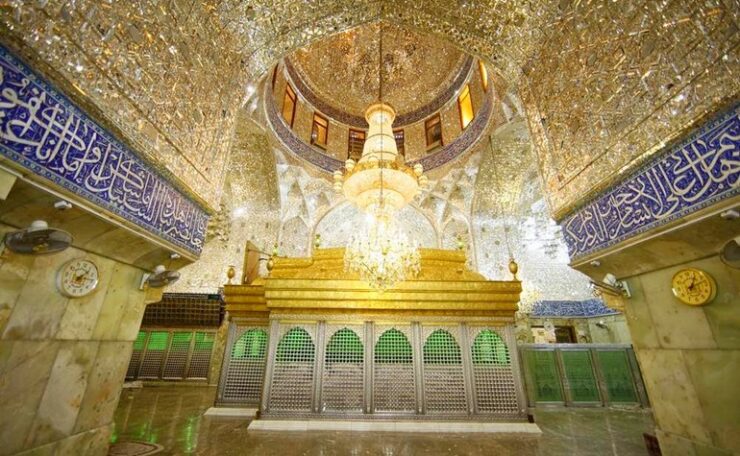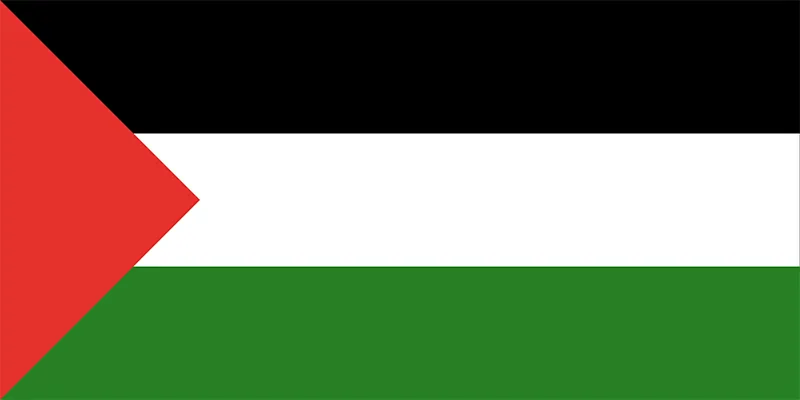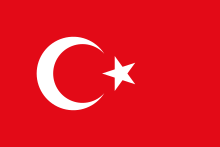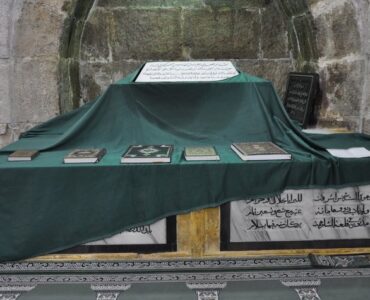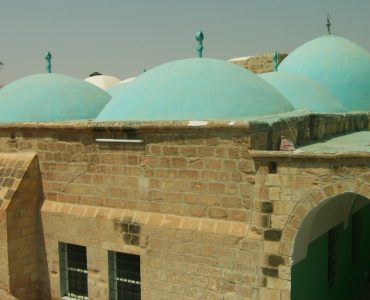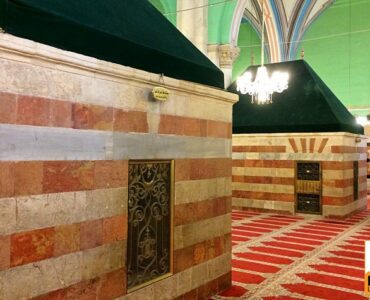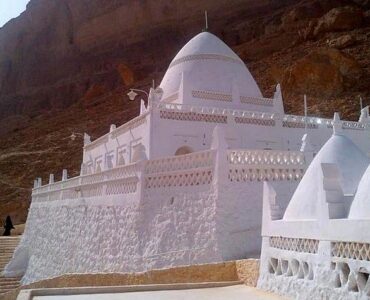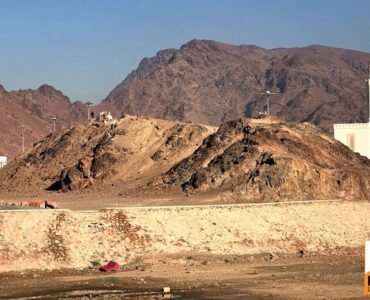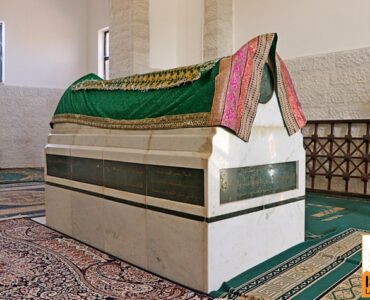This is the resting place of Hussain (رضي الله عنه) in Karbala. He was the son of Ali (رضي الله عنه) and the grandson of the Prophet Muhammad (ﷺ).
- Hussain (رضي الله عنه) was born in Sha’baan 4AH. He was brought to the Prophet (ﷺ), who was overjoyed. He chewed a date and placed it in the newborn’s mouth which he began to suck. The first thing to enter his stomach was the Prophet’s (ﷺ) blessed saliva. He then gave adhaan and iqaamat in his ears and named him Hussain. On the 7th day, he instructed that the head should be shaved, and that Sadaqa of silver should be given equivalent to the weight of the hair. Thereafter he did the aqeeqah, (sacrificed two goats for him).
- Hussain (رضي الله عنه) was looked after and breastfed by Ummul Fadhl Radiallahu (رضي الله عنها) , the wife of the Prophet’s uncle Abbas. She mentions that once the Prophet (ﷺ) was holding Hussain (رضي الله عنه) in his lap and was in a cheerful mood. He suddenly began to cry. She enquired about the reason. He replied “Jibreel just informed me that my Ummah will one day kill this beloved son of mine.” [Bayhaqi]
- The Prophet (ﷺ) has stated in a hadith:
“Hussain is mine and I am Hussain’s. May Allah love the one who loves Hussain. Hussain is a mighty grandson”. [Ibn Majah] - Hussain narrates that his grandfather the Prophet (ﷺ):
“It is from the beauty of a person’s Imaan that he leaves aside things that don’t concern him”
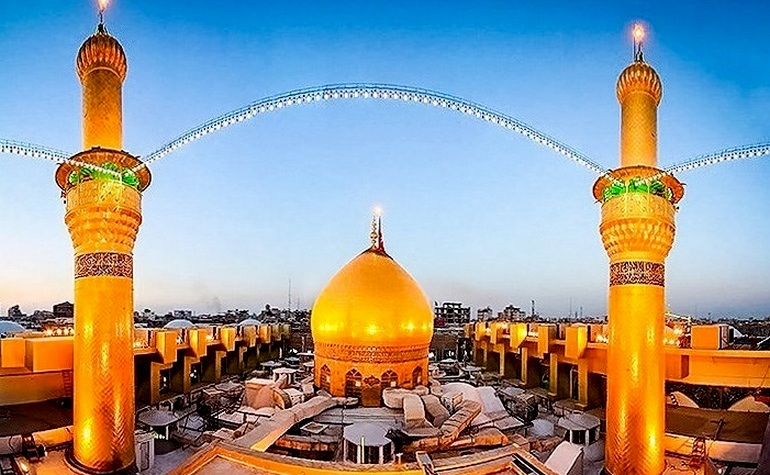

- Ibn Kathir writes, “Sayyiduna Abu Bakr may Allah be pleased with him) used to show great respect to the family of the Prophet (ﷺ). He used to treat Hussain with love, affection, and special attention. Same was the case with Sayyiduna Umar and Uthman (رضي الله عنهم)”. [Al-Bidayah, Tajalliyate Safdar]
- When the daughter of Kisra by the name of Princess Sheherbaanu was brought to Madinah Munawwarah among the captives, Umar (رضي الله عنه) said, “She is only suitable for Hussain.” He gave her to Hussain (رضي الله عنه) who freed her and married her. She gave birth to his son Ali Ibn Al Hussain who was later titled Imam Zain al-Abideen, due to the beauty of his worship.
- During the caliphate of Abu Bakr and Umar (رضي الله عنهم), Hussain (رضي الله عنه) was still growing up. In 26AH, during the Uthmani caliphate, he took part in the conquest of Tripoli. He was instrumental in that victory as well many others that followed. In 30AH, he was with Saeed Ibn Al-Aas (رضي الله عنه) in the conquest of Tabristaan, and thereafter in the conquest of Jurjaan.
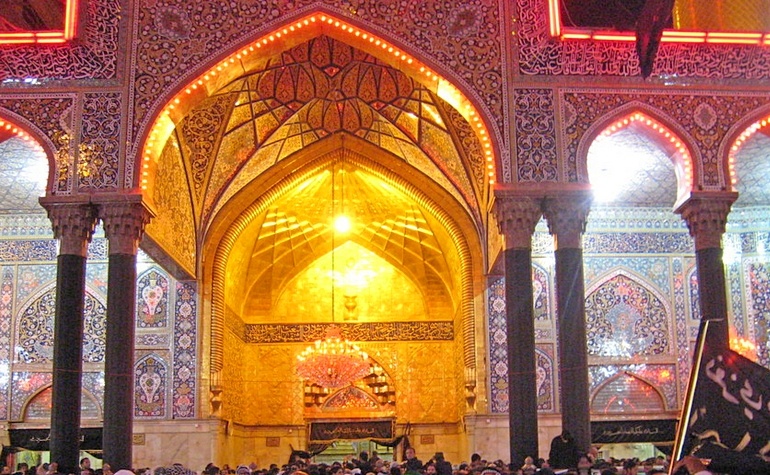

- In 34AH, when the rebels surrounded the residence of Uthman (رضي الله عنهم) and were thirsty for his blood, this brave prince offered his life, along with a group of youth. They would stand by the door and would guard his house, drawing the rebels back. Despite repeated requests to finish off the rebels and having the ability to do that, Uthman (رضي الله عنه) forbade them from shedding a single drop of blood for his protection. In the end, the rebels forced their way in to the neighbours’ property and jumped the walls. They then murdered Uthman (رضي الله عنه).
- After the martyrdom of Uthman (رضي الله عنه), the Muhajireen and Ansar pledged their allegiance to Ali (رضي الله عنه). Hussain (رضي الله عنه) was at his father’s side throughout the five years of his caliphate. He was a very obedient and humble son and took part in the notable battles of Jamal and Siffeen.
- After the death of his father, he treated his elder brother Hassan (رضي الله عنه), like a father figure. He would always be at his side and consult him in important affairs.
- After remaining khaleefa for just 6 months, Hasan (رضي الله عنه) handed the reign of leadership to Muawiyah (رضي الله عنه). Muawiyah (رضي الله عنه) treated the Ahle Bayt with utmost respect. He had fixed an allowance of 100,000 per annum for Sayyiduna Hasan and Hussain (رضي الله عنهم). When they would travel to Shaam or Muawiyah (رضي الله عنه) would come Madinah, they would treat each other with generosity and hospitality.
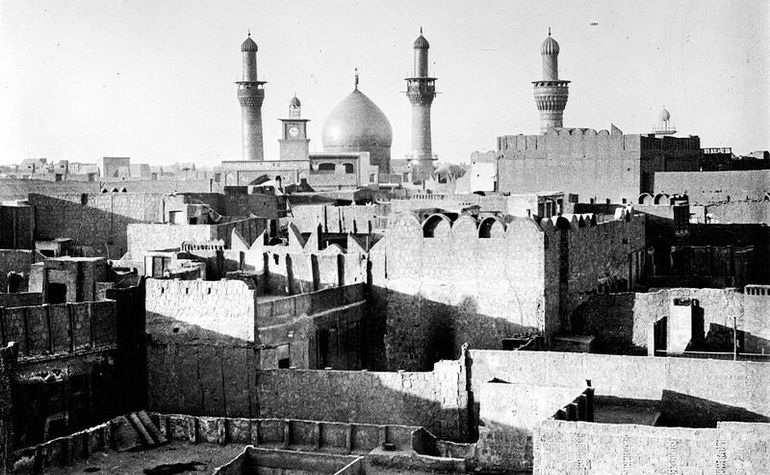

- When Hassan (رضي الله عنه) died in 50AH, Hussain (رضي الله عنه) became the eldest among the prophetic household. He was the best person on the face of the earth at that time. Once Abdullah bin ‘Amr ibn al-Aas (رضي الله عنه) was sitting in the Haram shareef, near the Ka’ba, when Hussain (رضي الله عنه) entered. He looked at his radiant face and remarked, “Among all the people on the face of this earth, this person is the most beloved to the angels of the heavens”. Abdullah Ibn Abbas (رضي الله عنه) would feel proud in holding on to the stirrup of Husain’s (رضي الله عنه) saddle when he would ride on the horse.
- Hussain (رضي الله عنه) was martyred in Karbala in 10 Muharram 61AH. He was aged 57.
References: Shaykh Abdul Raheem Limbada
Note that this entry has been shown for information purposes only. On no account should anybody pray to a grave or seek supplication through them as this is tantamount to committing shirk, associating partners with Allah (ﷻ)

